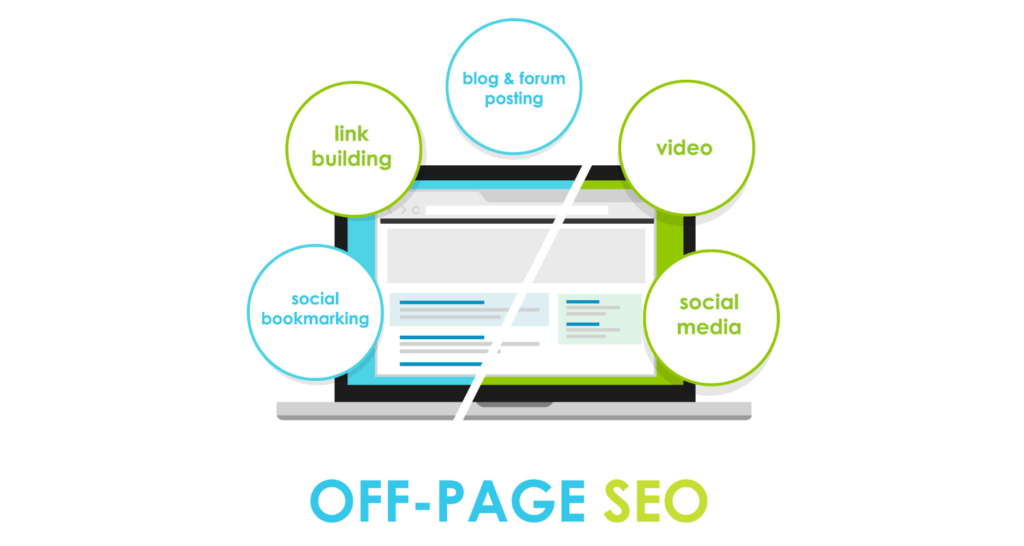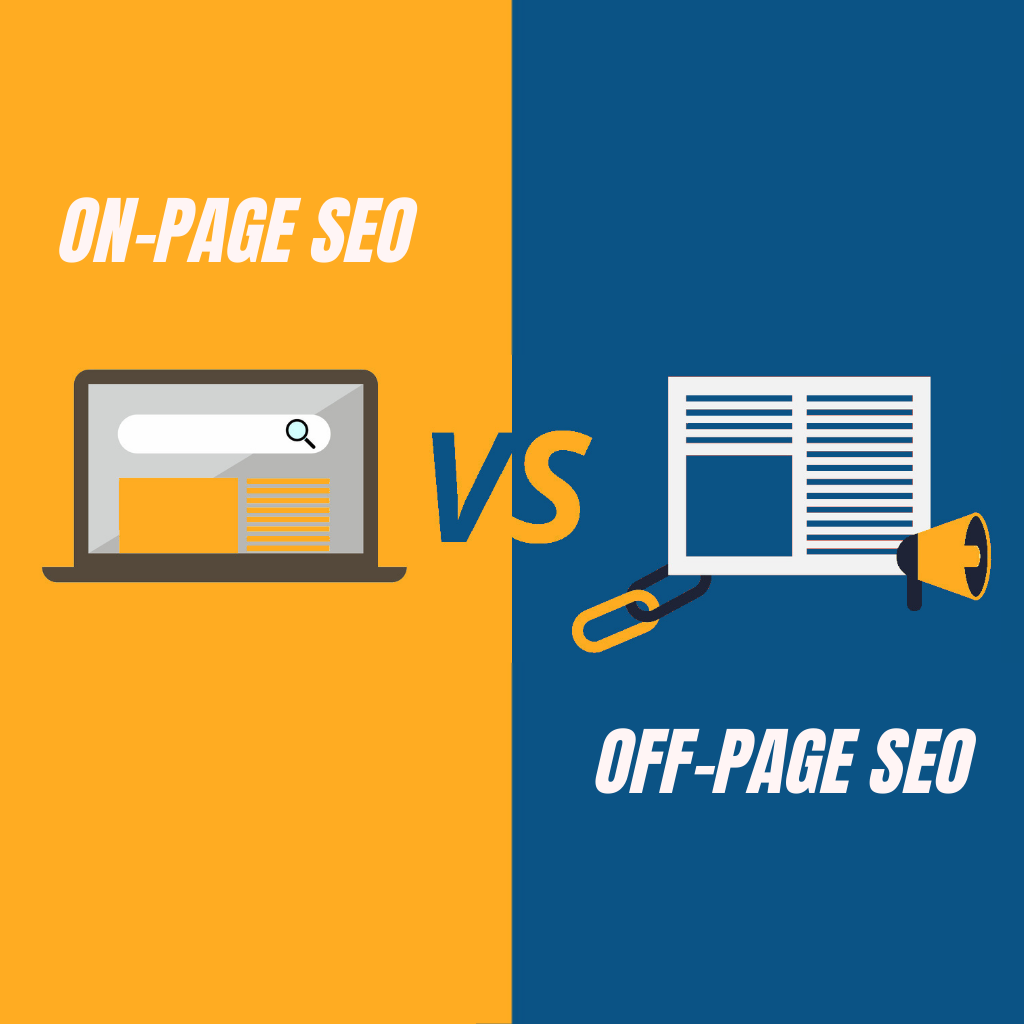What is On-Page SEO?
First, let’s discuss what on-page SEO is and why it is essential to your website. On-page search engine optimization focuses on improving web pages and content to produce more organic traffic and rank higher in SERPs. On-page SEO includes optimizing the HTML, meta data, keyword density, and internal links. Aside from the technical stuff, on-page SEO also involves creating and posting high-quality, engaging content with topic-related images. As a note, you should always optimize all of the text copy, schema markup, image file names, and alternative image text (alt-text) with data-driven, keyword-rich content.
What is Off-Page SEO?
Off-page SEO is exactly what it sounds like, it’s off the physical page of content, and it is still significant for your website. Off-page SEO relates to the actions taken beyond your website to improve search results. Off-site optimization involves improving the user’s perception of the site’s relevance, popularity, domain authority, expertise within particular industries and topics, and site trustworthiness. One way that you can accomplish this is by having other reputable places on the Internet promote and link to your content. For most off-page SEO ranking factors, you don’t have direct control over the optimization. This loss of optimization control relies on factors like backlinks, Google’s E-A-T (Expertise, Authority, Trust) algorithm, and online reviews. However, backlinks do present opportunities to control off-page SEO to an extent, such as creating a reciprocal campaign with other websites and linking to each other or paying specific directory sites for placement on their website.
It’s Important to Know the Differences between On-Page vs. Off-Page SEO
Besides the fact that on-page SEO occurs on the actual page and off-page SEO happens off the page, the other main difference between on-page and off-page SEO is the direct control over the optimization. You have direct control over on-page SEO, whereas you don’t have control over off-page SEO. Knowing the difference between on-page and off-page SEO ensures that you optimize the critical aspects of your website. You want to implement an SEO strategy that hits both forms of SEO. By combining on-page and off-page SEO efforts into an optimal strategy, you can increase your SEO ranking, organic success, and digital footprint.
On-Page SEO Ranking Factors

On-page SEO requires looking at the following factors.
- Page Content Quality: Must have the right keywords for SEO and relevant content.
- Page Content Structure: All meta data must be optimized, including the page titles, title tags, meta descriptions, header tags (H1, H2, etc.), and image alt text.
- URL Structure & Hierarchy: This structure ensures the content is easy to understand, while the hierarchy looks at the folders for navigation creating topic clusters for your site content.
- Internal Linking: Interlinking to other pages within your website to assist with topic clusters.
- External Linking: Outbound links to other reputable sites that don’t compete for the same keyword.
- Site & Page Load Speed: This shows how fast the website and web pages load.
- Mobile Responsiveness: Ensuring that website pages provide optimal user experience and functionality for mobile users.
How to Optimize Your On-Page SEO
If you are looking for technical support with your on-page SEO efforts, consider these simple tips for on-page optimization.
- Write short, descriptive, and structured page URLs.
- Write meta descriptions that compel the user to take an action.
- Optimize the meta title tags.
- Implement structured data markup.
- Follow SEO copywriting best practices.
- Optimize the header tags on every page.
- Use your target keyword(s) within the first 100 words and semantically throughout the content.
Off-Page SEO Ranking Factors

Off-page SEO requires looking at these factors.
- Backlinks: Links coming from other websites to your pages.
- Online Reputation: Customer reviews and online reliability of your brand.
- Public Relations (PR): Increases brand awareness and creates branded searches.
- Google’s E-A-T Algorithm: Expertise-Authority-Trust is how Google determines if your website is a reputable source of information.
How to Improve Your Off-Page SEO
If you are looking for some help with your off-page SEO efforts, consider these simple optimization tips.
- Focus on link building with reputable sites.
- Harness the power of social media.
- Comment on reputable sites with a link back to yours.
- Offer guest posts on reputable sites.
- Incorporate sharable content, such as photos and videos.
- Focus on public relations (PR).
- Improve the online reputation of your brand with reputation management.
What is Technical SEO?
Technical SEO involves what is “under the hood” of your website. Much like on-page SEO, technical SEO involves controllable ranking factors. Here are some technical SEO tips to consider:
- Crawling: Process that search engines use to categorize your site.
- Indexation: How search engines organize your website’s information for search queries.
- UX (User Experience): Showcases how your site focuses on the needs of your visitors.
- Clean Structured Code (HTML/CSS/JavaScript): The code must follow a flowing method that is easy to navigate and alter. Clean code structure also applies to schema markup, also known as structured data markup.
Technical SEO Ranking Factors
These are the most crucial factors for technical SEO.
- Site Security (SSL): This certification helps to build trust among users and search engines.
- Indexation: You must ensure that search engine crawlers can properly index your website.
- Crawlability: You want the search engine bots to crawl the site with ease.
- XML Sitemap Structure: This roadmap highlights the pages on your website.
- Structured Data Markup: The process of utilizing and applying Schema.
- Mobile-Friendliness: The site must provide a great user experience for mobile customers.
- Page Speed: How fast the page loads affect its ranking and UX.
- AMP Capability: This capability helps certain pages load faster on mobile devices.
- Duplicate Content Issues: If the content is duplicated or plagiarized, it will harm the SEO ranking.
The Perfect Partner for All Your SEO Marketing Efforts

At Reach Marketing Pro, we have the SEO industry knowledge needed to help you get ahead. We can accelerate your SEO marketing efforts when you partner with us, whether you need help with on-page SEO, off-page SEO, technical SEO, or local SEO. Our team can help you rank for relevant keywords to gain more business and surpass your competitors. Contact us for your consultation today.






